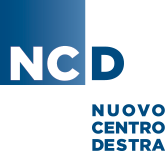Alternative Popolare
| Alternative Popolare | |

|
|
| Party leader | Paolo Alli (Presidente) |
| founding | November 15, 2013 (emerged from: Il Popolo della Libertà ) |
| ideology | Christian Democratic |
| European party | European People's Party |
| MPs |
0/630 |
| Senators |
0/320 |
| MEPs |
0/76 |
| Headquarters |
Via in Arcione 71 |
| Website | www.alternativapopolare.it |
Alternativea Popolare ( AP for short , German “Popular Alternative” or “Volksalternative”), until March 2017 Nuovo Centrodestra ( NCD , “New Right Center”), is a Christian Democratic party in Italy . It emerged in 2013 as a split from Silvio Berlusconi's party Il Popolo della Libertà . Angelino Alfano was the chairman from its inception until September 2018 . Since then it's Paolo Alli .
Nuovo Centrodestra (2013-17)
After Silvio Berlusconi had announced the conversion of his party Il Popolo della Libertà (People of Freedom) in Forza Italia , his former companion, Italy's then Interior Minister Angelino Alfano, instead founded the new party on November 15, 2013. In contrast to Berlusconi's Forza Italia, which was now in the opposition, Alfano's group supported the Letta cabinet , which would otherwise have lost its majority.
In addition to Alfano, the NCD included Maurizio Lupi (former transport minister ), Beatrice Lorenzin (health minister ), Gaetano Quagliariello (former reform minister), Giuseppe Scopelliti (president of the Calabria region), Roberto Formigoni (former president of the Lombardy region) and Renato Schifani (former President of the Italian Senate).
After Letta changed top government to Matteo Renzi in February 2014, the NCD remained in the ruling coalition. She was represented in the Renzi cabinet by Interior Minister Alfano, Health Minister Beatrice Lorenzin and Transport Minister Maurizio Lupi (until March 2015).
Since its inception, the NCD has worked closely with the Christian Democratic Unione di Centro (UdC). In May 2014, both parties entered the European elections with a joint list , which received 4.4% of the vote and three seats in the European Parliament (including Giovanni La Via and Massimiliano Salini from the NCD). In December of the same year, the NCD and UDC merged in both chambers of parliament to form a parliamentary group called Area Popolare (AP, roughly: "Territory of the People's Parties"). In January 2015, the NCD, as the ruling party, supported the PD candidate for the office of President Sergio Mattarella .
While the NCD continued the center-left coalition with Renzis PD at the national level, the party formed a coalition in the center-right block with Forza in the regional elections in May 2015 in Campania , Marche , Liguria and Umbria - sometimes under the list name Area Popolare Italia . In Apulia and Veneto they cooperated with deviants from the center-right spectrum ( Raffaele Fitto and Flavio Tosi ). The results of the NCD or Area Popolare varied between 1.2% in Tuscany and 6.4% in Apulia.
Over time, NCD lost several prominent members: Quagliariello founded the small party Identità e Azione in 2015 , Schifani returned to Forza Italia in 2016. Since the NCD campaigned for a yes at the constitutional referendum in 2016 with the Renzi government, while the UdC campaigned for a no, the AP alliance broke up in December 2016. Initially, the alliance with Pier Ferdinando Casini's UdC spin-off Centristi per l'Europa , which continues the Government supported, continued. After Renzi's resignation as Prime Minister, the NCD continued the coalition with the PD under Paolo Gentiloni . In his cabinet , the NCD continued to occupy the interior (Alfano) and the health department (Lorenzin).
Alternativa Popolare (since 2017)
In March 2017, the NCD was renamed Alternativea Popolare. This marked the end of the Area Popolare alliance .
For the parliamentary elections in March 2018 , the Alternativa Popolare joined the Centristi per l'Europa, Italia dei Valori and Unione per il Trentino as the List Civica Popolare . This united bourgeois-conservative small parties that were part of Renzi's center-left coalition and was led by Health Minister and AP politician Beatrice Lorenzin . Some of the AP members who did not want to continue the coalition with Renzi, including Maurizio Lupi and Roberto Formigoni , left the party in the run-up to the election and joined the Noi con l'Italia list , part of Berlusconi's center-right bloc and Matteo Salvinis belonged. Civica Popolare received 0.5% of the vote and, thanks to its alliance with the center-left coalition, received two seats in the House of Representatives (Lorenzin and Gabriele Toccafondi ) and one in the Senate (Casini). The two AP MPs then sat in the "mixed group" of non-attached MPs.
Angelino Alfano resigned as party chairman in September 2018. His successor was the former MP Paolo Alli from Lombardy. For the 2019 European elections , the AP formed a joint list with Mario Adinolfi's group Il Popolo della Famiglia , which received 0.4% of the vote. The two remaining AP MPs left the party in September 2019 to join the Partito Democratico (Lorenzin) and Matteo Renzi's new party, Italia Viva (Toccafondi).
Web links
Individual evidence
- ↑ Berlusconi party splits and renames itself. In: The press . November 17, 2013, accessed November 24, 2013 .
- ↑ Kevin Lees: What the Alfano-Berlusconi split means for Italian politics . In: Suffragio , November 18, 2013. Retrieved November 20, 2013.
- ↑ Jörg Bremer: “Good job, President Mattarella!” FAZ, January 31, 2015
- ^ Italian metamorphoses after Renzi's resignation. In: The Standard . March 28, 2017. Retrieved March 29, 2017 .

